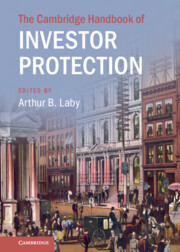Book contents
- The Cambridge Handbook of Investor Protection
- The Cambridge Handbook of Investor Protection
- Copyright page
- Dedication
- Contents
- Contributors
- Acknowledgments
- Introduction: Continuity and Change in Investor Protection
- Part I Institutionalization and Investor Protection
- 1 The Financialization of Corporate Governance
- 2 “Public” Mutual Funds
- 3 The Overlooked Effects of Passive Management
- 4 Retail Investor Protection and Empowerment: Reflections from the European Union
- 5 Which Investors to Protect?
- Part II The Scope of Investor Protection Regulation
- Part III The Regulation of Market Professionals
- Part IV Alternative Regulatory Regimes
- Index
3 - The Overlooked Effects of Passive Management
from Part I - Institutionalization and Investor Protection
Published online by Cambridge University Press: 20 October 2022
- The Cambridge Handbook of Investor Protection
- The Cambridge Handbook of Investor Protection
- Copyright page
- Dedication
- Contents
- Contributors
- Acknowledgments
- Introduction: Continuity and Change in Investor Protection
- Part I Institutionalization and Investor Protection
- 1 The Financialization of Corporate Governance
- 2 “Public” Mutual Funds
- 3 The Overlooked Effects of Passive Management
- 4 Retail Investor Protection and Empowerment: Reflections from the European Union
- 5 Which Investors to Protect?
- Part II The Scope of Investor Protection Regulation
- Part III The Regulation of Market Professionals
- Part IV Alternative Regulatory Regimes
- Index
Summary
By many accounts, investors, particularly retail investors, are a beleaguered bunch. The reasons for this are numerous. The global COVID-19 pandemic that has caused suffering for millions of people and depleted global economic value is only the most palpable among them. Other significant concerns have persisted for decades. One of them is that the fees investors must pay to mutual fund managers and securities brokers are generally too high, depriving investors from realizing the full benefit of the appreciation of their investments or, worse, depleting the investments’ value. A second is that, regardless of how much an investor loses in fees, she is likely to lose also as a result of the particular investment strategies by which her investments are managed, which often are unable to generate returns exceeding market returns.
- Type
- Chapter
- Information
- The Cambridge Handbook of Investor Protection , pp. 60 - 75Publisher: Cambridge University PressPrint publication year: 2022

